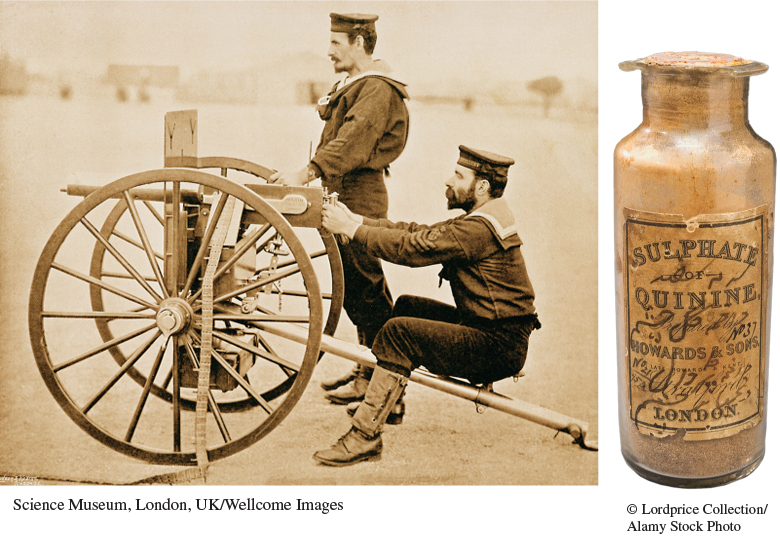A History of Western Society: Printed Page 810
A History of Western Society, Value Edition: Printed Page 780
A History of Western Society, Concise Edition: Printed Page 811
Causes of the New Imperialism
Many factors contributed to the late-
Economic motives played an important role in the extension of political empires, especially in the British Empire. By the late 1870s France, Germany, and the United States were industrializing rapidly behind rising tariff barriers. Great Britain was losing its early economic lead and facing increasingly tough competition in foreign markets. In this changing economic climate, the seizure of Asian and African territory by continental powers in the 1880s raised alarms in Britain. Fearing that France and Germany would seal off their empires with high tariffs, resulting in the permanent loss of future economic opportunities, the British followed suit and began their own push to expand empire.
Actually, the overall economic gains of the New Imperialism proved quite limited before 1914. The new colonies were simply too poor to buy much, and they offered few immediately profitable investments. Nonetheless, even the poorest, most barren desert was jealously prized, and no territory was ever abandoned. This was because colonies became important for political and diplomatic reasons. Each leading country saw colonies as crucial to national security and military power. For instance, safeguarding the Suez Canal played a key role in the British occupation of Egypt, and protecting Egypt in turn led to the bloody conquest of Sudan. Far-
Along with economic motives, many people were convinced that colonies were essential to great nations. “There has never been a great power without great colonies,” wrote one French publicist. The influential nationalist historian of Germany, Heinrich von Treitschke, spoke for many when he wrote: “Every virile people has established colonial power. . . .
Treitschke’s harsh statement reflects not only the increasing aggressiveness of European nationalism after Bismarck’s wars of German unification, but also Social Darwinian theories of brutal competition among races (see Chapter 23). As one prominent English economist argued, the “strongest nation has always been conquering the weaker . . . and the strongest tend to be best.” Thus European nations, which saw themselves as racially distinct parts of the dominant white race, had to seize colonies to show they were strong and powerful. Moreover, since victory of the fittest in the struggle for survival was nature’s inescapable law, the conquest of “inferior” peoples was just. “The path of progress is strewn with the wreck . . . of inferior races,” wrote one professor in 1900. “Yet these dead peoples are, in very truth, the stepping stones on which mankind has risen to the higher intellectual and deeper emotional life of today.”8 Social Darwinism and pseudoscientific racial doctrines fostered imperialist expansion.
So did the industrial world’s unprecedented technological and military superiority. Three aspects were particularly important. First, the rapidly firing Maxim machine gun, so lethal at Omdurman, was an ultimate weapon in many another unequal battle. Second, newly discovered quinine proved no less effective in controlling malaria, which had previously decimated whites in the tropics whenever they left breezy coastal enclaves and dared to venture into mosquito-

Social tensions and domestic political conflicts also contributed mightily to overseas expansion. In Germany and Russia, and in other countries to a lesser extent, conservative political leaders manipulated colonial issues to divert popular attention from the class struggle at home and to create a false sense of national unity. Thus imperial propagandists relentlessly stressed that colonies benefited workers as well as capitalists, providing jobs and cheap raw materials that raised workers’ standard of living. Government leaders and their allies in the tabloid press successfully encouraged the masses to savor foreign triumphs and to glory in the supposed increase in national prestige. In short, conservative leaders defined imperialism as a national necessity, which they used to justify the status quo and their hold on power.
Finally, certain special-